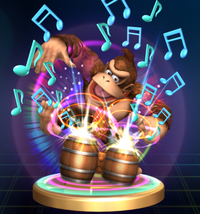Konga Beat
Konga Beat (タルコンガビート, Barrel Conga Beat) is Donkey Kong's Final Smash, where he gets out his bongos and plays them. This involves him creating shock waves to attack his opponents. The announcer says "Ready? Go!", then part of the "DK Island Swing" song plays, with DK clapping and playing the drums.
If a player doesn't press any buttons, the shock wave created just barely covers DK. However, the player can increase the power and range of the attack by timing their button presses to the beat of the music. When a player press the attack button to the beat, he claps or strikes the bongos, creating a forceful wave each time. The strong shock wave's diameter is a bit bigger than Final Destination, while the weak shockwaves have a vacuum effect, making it harder for foes to escape the player's stronger, better timed waves.
During the Final Smash, DK is invincible but immobile. If it is used at the wrong place and the wrong time, the other players can dodge the entire attack simply by staying away from DK.
The immobility can also cause other problems - in scrolling stages like Rumble Falls, DK may be taken away from the screen. This is reduced somewhat as the Final Smash slows down the stage while it's in use, though it can still result in DK becoming vulnerable near the edge when the move ends. Using the move in midair will cause DK to scroll with the screen.
Konga Beat returns in Super Smash Bros. 4. It now displays a rhythmic tracker and can be made stronger.
Timing
As the attack begins, red circles will appear and shrink upon the bongos. These rings serve as a timing aid, if the player presses the attack button when the ring lines up with the drums, he will get a large shock wave that can do 15% damage or so. Alternately, the player can hit the button just as DK raises his hands to strike the bongos. If the player does 4 successful beats in a row, Donkey Kong will clap, creating a shock wave that has more knockback.
In Super Smash Bros. 4, this has been replaced with an indicator bar that circular beat symbols pass through; pressing the button as the indicator passes the circle on the left side of the bar will strengthen the attack. The bar also keeps track of the number of correctly timed beats performed in a row and will display a message saying "Good", "Miss", or "Great" each time the player attempts to match the beat.
Origin
Bongos were Donkey Kong's musical attack in Donkey Kong 64 for the Nintendo 64. They would later play a more important role in the GameCube rhythm game, Donkey Konga, and its sequels, Donkey Konga 2 and Donkey Konga 3, and were used as the controls for Donkey Kong Jungle Beat. In fact, the bongos DK uses for Konga Beat are almost an exact replica of the bongo controller used for Donkey Konga. The final smash involves Donkey Kong hitting the bongos and clapping in between; and the player pressing the A Button within rhythm with accurate timing, which are a translation of the gameplay of Donkey Konga. In Donkey Kong Jungle Beat, Donkey Kong could make similar circular waves by clapping to stun the enemies. The name of this move is a portmanteau of Donkey Konga and Donkey Kong Jungle Beat. The new timing indicator in Super Smash Bros. 4 is directly copied off the timing indicator used in the Donkey Konga games.
Brawl Manual description
"Attack by beating out a vicious beat on the DK bongos. DK is invincible - you can power the attack up by pressing A in time with the music."
Super Smash Bros. for Nintendo 3DS foldout description
"Press ![]() in time with the music to attack foes."
in time with the music to attack foes."
Trophy description
- Konga Beat
- DK about to go to town with some bongos! His performance is so magnificent and upbeat that it creates damage-inducing sound waves. Press the buttons in time to the music, and the sound waves may grow stronger. DK's invulnerable when launching this attack, but he's also immobile, so be careful using it on scrolling stages.
: Super Smash Bros. Brawl
Gallery
Trivia
- There are 3 beats that occur even before the announcer says "Ready? Go!".
- If used during a stage-wide slow-time effect (such as those caused by Dialga, Slow Brawl, or Training Mode), the shock waves created by a perfect beat can grow to enormous size because the timing can be even more accurate. A high level CPU will perform this perfectly, and the shock waves produced will be stretched, blurry, and semi-transparent. In the same way, a perfect beat is much more difficult to accomplish when time is sped up during a Fast Brawl.
- Because of lag in Wi-Fi matches, the music and rhythm of the attack may become out of sync, making it harder to produce large shockwaves.
- In Super Smash Bros. 4, hitting all the notes perfectly will have DK give a thumbs-up at the end of the move instead of his usual bicep-flexing gesture. However, when DK misses a note, at the end, he will use his bicep-flexing gesture.
- Konga Beat is the only gameplay move in the entire Smash series that invokes the Announcer.
- Unusually, the "Ready? Go!" soundbite used in Smash 4 is taken from Brawl and features Pat Cashman's voice instead of Xander Mobus's. As a result, Pat Cashman appears in the game's credits.

